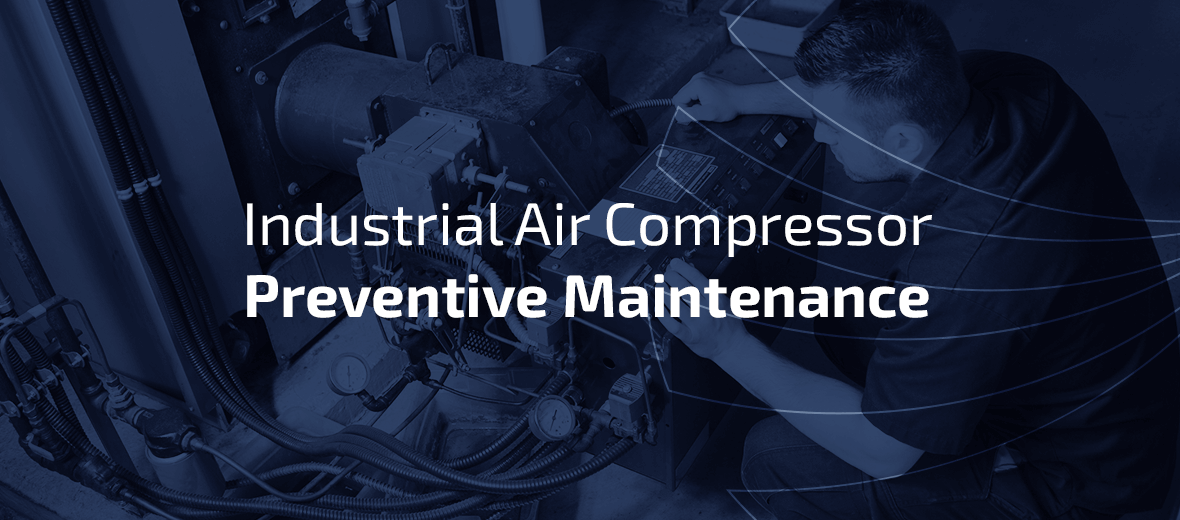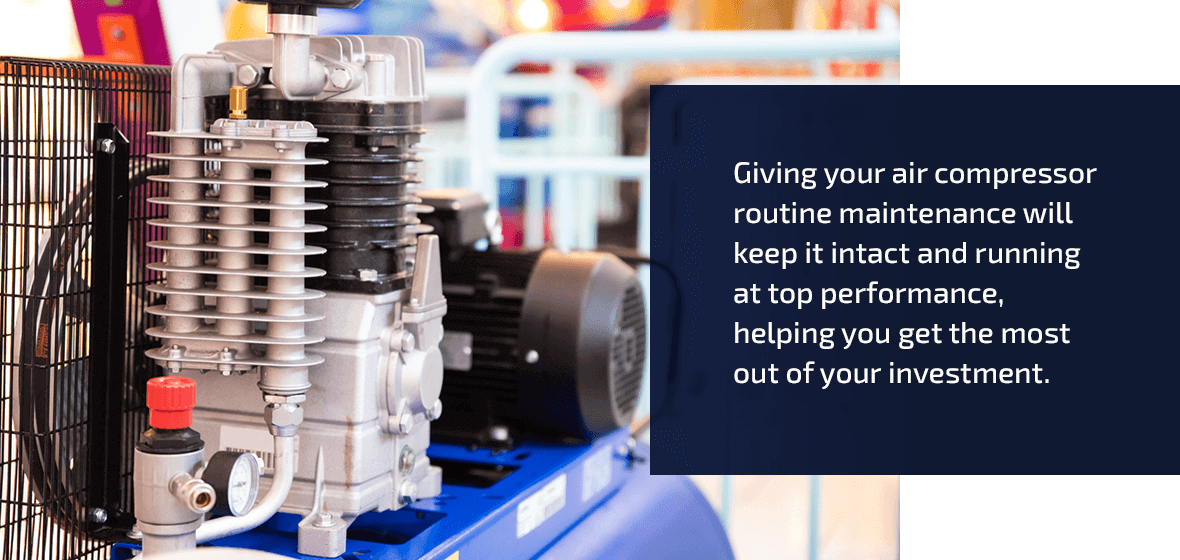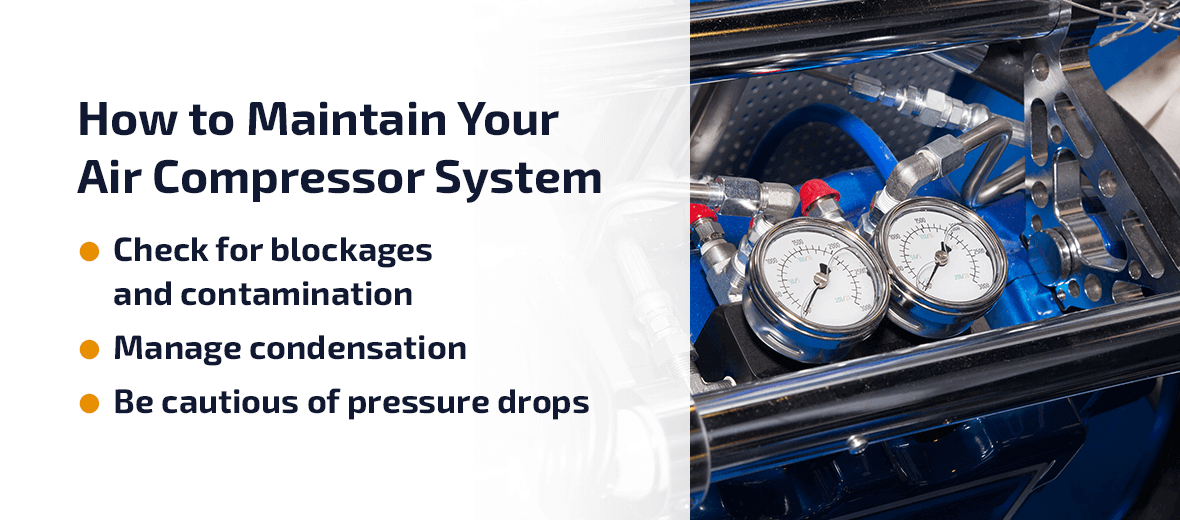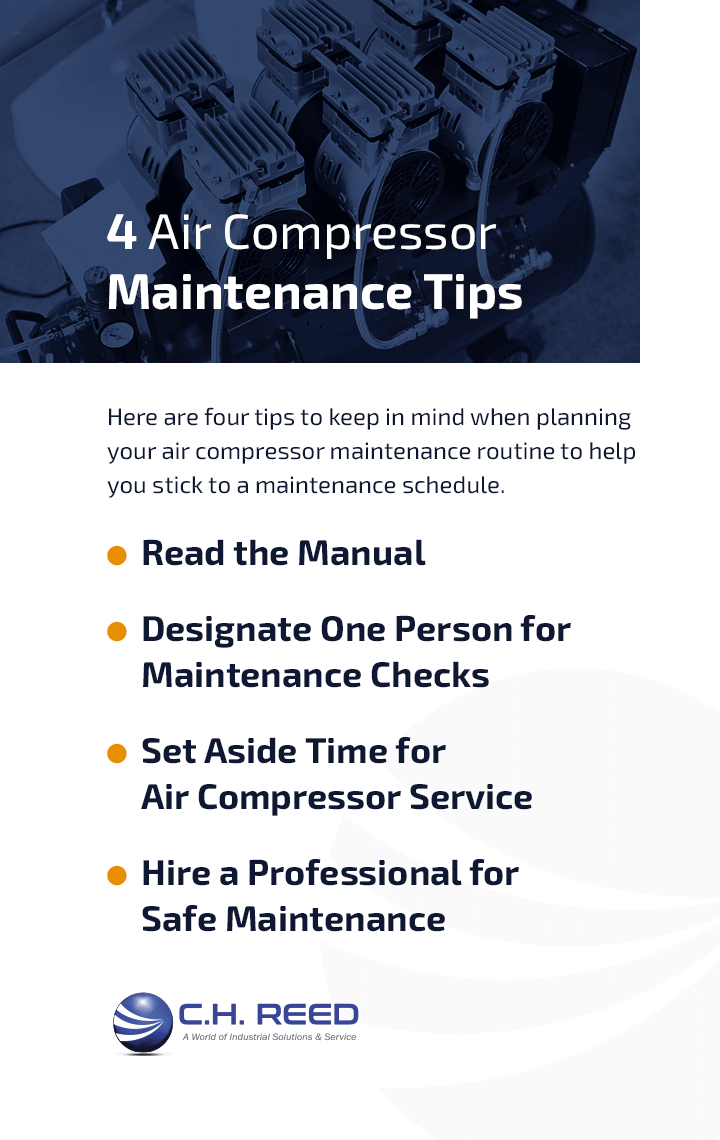April 7, 2022
Industrial Air Compressor Preventive Maintenance
SHARE THIS POST

Developing a preventive maintenance routine for your air compressor is crucial in extending the life of your system and equipment.
Like most mechanical equipment, air compressors require routine maintenance. Sticking to a regular maintenance schedule will help you keep your compressors in good condition and operating efficiently. Preventative maintenance will let you detect potential concerns in your air compressors before they need expensive emergency repairs and keep avoidable issues from becoming damaging problems.
Creating a maintenance schedule and checklist helps ensure that you clean and inspect all components on a regular basis. So what should your maintenance routine look like?
We’ll cover what areas to check most frequently and why preventive maintenance is important for air compressors. We’ll also offer some tips for successfully sticking to a maintenance routine.
Preventive Maintenance vs. Standard Maintenance
Many businesses conduct standard maintenance, which often covers things like oil changes or filter changes for the purpose of extending the life of the system. Standard maintenance is largely a solution for simple operations, like continuously updating computer software or refilling a printer’s ink.
High-tech machinery like rotary screw air compressors, on the other hand, requires routine preventive maintenance. Preventive maintenance helps ensure the equipment’s longevity and confirms that the parts are working together as they should. Industrial air compressors need preventive maintenance and system inspections to ensure optimal operating conditions, energy efficiency, and continuous, reliable performance. These inspections and maintenance checks serve to detect problems with the equipment before they become serious, helping you avoid costly emergency repairs and downtime.

Importance of Regular Preventive Maintenance
Preventive maintenance checks can help increase your equipment’s lifespan, increase energy efficiency, minimize downtime, lower the total cost of ownership, and provide peace of mind. When you invest in capital equipment like air compressors, it’s crucial to give them the care they need to last. Giving your air compressor routine maintenance will keep it running at top performance, helping you get the most out of your investment. Additionally, identifying potential issues early on helps prevent further damage, save money on repairs and avoid downtime.
It takes time to repair or replace damaged air compressors, which can result in production downtime. Along with the cost of replacement or repairs, you may also face losses from your operation running below peak efficiency. Routine preventive maintenance ensures maximum efficiency, letting you continue maximizing your uptime to earn more money.
Finally, clean, dry air is crucial for a wide array of light and heavy-duty applications in a manufacturing plant. Consistent preventive maintenance ensures your compressors are properly filtering the air before it reaches other equipment in your facility, as your equipment needs clean air to continue working correctly. Dirty and damaged air filters can cause contamination to get carried downstream and cause problems that compromise your equipment. Preventative maintenance ensures that filters are checked and replaced at regular intervals.
Areas to Check Most Frequently
Four areas of an air compressor need to be at the top of your preventive maintenance checklist – vents, filters, bearings, and belts. These components can be especially troublesome for an air compressor system when dirt, debris, and contaminants build up in and around them. Keep the following things in mind when going through your air compressor maintenance checklist:
- Vents: Intake vents are responsible for pulling ambient air into the compressor to filter and use it as a replacement for electric power. With dirt blocking the vents and clogging up the system, the compressor must work harder to produce clean air. Clean the vents often to ensure your air compressor isn’t sucking in the dirt to keep the machine running smoothly.
- Oil filters: The oil filters remove any oil from the air before the air leaves the machine. Oil degrades the compressed air’s quality and can ruin the processes and surfaces you use the air on. Ensure you’re replacing your oil filters at the recommended intervals for your machine.
- Air filters: Air filters play the leading role in an air compressor producing pure, compressed air. The compressor filters ambient air to remove contaminants and impurities, preventing the end applications from degrading. You should clean your air filters regularly and change them at regular intervals.
- Bearings: You should inspect the motor bearings to ensure they’re properly greased to prevent rust. If rust forms, the bearings will begin slowing down and eventually get stuck, causing the motor to fail. Grease and inspect the bearings to protect the motor’s performance and health.
- Belts: Belts need to maintain proper tension to keep an air compressor’s internal motions going. Rubber belts should be flexible and firm to keep movements balanced. Over time and with heavy use, belts will wear down, crack and lose their tension. Be sure to regularly inspect the belts so you can replace them before they get too loose or snap.
Lubrication is another component to keep in mind. Like the motor bearings, many air compressor parts need lubricant to run smoothly and without corrosion. Just like in automobiles, changing your air compressor’s oil at regular service integrals is crucial to equipment reliability and longevity.
Maintaining these key components of your air compressor system is vital to the effectiveness of the parts individually and the effectiveness of the compressor as a whole.

How to Maintain Your Air Compressor System
While the components listed above are among the most important to remember, you should also include other areas in your regular maintenance. Here are some additional ways to clean and maintain your air compressor to prevent costly damages:
- Check for blockages and contamination: Dirt, dust, rust and other debris can block or clog pipes and other pathways for the compressed air. Blockages lead to decreased pressure valves that will interrupt normal operations. Contaminated pipes can also lower the effectiveness of internal components, making it difficult to power heavy-duty equipment.
- Manage condensation: As your compressor removes moisture from the air, the moisture can build into condensation. Moisture collecting in the machine can affect the air’s quality and lead to premature rusting and damage to the electrical circuits. Condensation can also build up due to excessive humidity and changing temperatures, so it’s crucial to watch for condensation and clear it regularly.
- Be cautious of pressure drops: While pressure drops are common, they will put excessive strain on the machine if your compressor’s pressure drops too much. It’s best to replace any necessary parts that are showing wear and tear before they create problems like significant pressure drops. Another action you can take to combat pressure drops is to add air compressor storage to your system.
In addition to cleaning these components, check that the compressor is running at a normal temperature and voltage. Watch for excessive vibrations, check that the air dryer is functioning properly and that oil levels are adequate.
How Often Should Air Compressors Be Serviced?
Creating an air compressor maintenance schedule is key to keeping track of when you need to clean, replace and inspect the system’s components. Creating a maintenance schedule and checklist helps you keep track of when you need to service which components. It is crucial to always follow the compressor manufacturer’s recommended service intervals.
Depending on the part and necessary maintenance, you’ll need to service your air compressors in intervals ranging from daily to yearly. How often you service your air compressor will also depend on how often you use it. If you only use it occasionally, you may be able to get away with only doing a monthly routine checklist. However, if you use your air compressor on a regular basis and your business relies on compressed air, it’s best to conduct maintenance checks more regularly as well.
Starting with an air compressor daily checklist, here are routine checks you and your team should be making.
Daily
Here are the preventive maintenance tasks you should do every day:
- Check oil levels.
- Ensure the compressor cools down.
- Check lubrication.
- Ensure all the controls work.
- Look for visual signs of damage.
- Ensure you’ve accounted for all parts.
- Look for external factors that could affect operations.
Weekly
Check the following items on a weekly basis:
- Dryer
- Display readings
- Temperature
- Coolers
- Condensation build-up
- Amps and voltage
- Belts
- Oil levels
Monthly
You should check and clean the dryer, filters and drain valves every month. Check the belt tension and make adjustments or replacements as necessary. You should also take this time to inspect the overall condition of the compressor and look for air leaks in hoses.
Quarterly
Every three months, check for upcoming services and look at how many hours you’ve run the unit. Do an oil change and change the oil filter if necessary. Check the torque on the pulley screws and nuts every few months. It’s also a good idea to check the contact points of the motor area and pressure switch.

4 Air Compressor Maintenance Tips
Keeping up with an air compressor maintenance schedule can be a daunting task. You have numerous components to check if you want to keep your air compressor running efficiently and lasting as long as possible. Here are four tips to keep in mind when planning your air compressor maintenance routine to help you stick to a maintenance schedule.
1. Read the Manual
Because different makes and models of air compressors may have different needs, it’s best to consult the user’s manual when conducting maintenance. Some manuals may even contain a suggested maintenance checklist for your specific unit.
If you’re conducting your own air compressor maintenance, it’s best to read the manual before making any changes or fixes to your unit. The manual can give you a deeper understanding of the parts in question, allowing you to perform successful maintenance checks. Should you just dive in without prior knowledge, there’s a chance you could turn a minor problem into a costly repair.
Additionally, you may find that the manual contains solutions for many common issues, letting you save money on calling in a service professional.
2. Designate One Person for Maintenance Checks
To help keep things organized, it’s best to designate one person who will be responsible for ensuring the maintenance checks occur. When one person is responsible for keeping track of the maintenance, there’s less chance of miscommunication and forgotten maintenance tasks.
3. Set Aside Time for Air Compressor Service
Make air compressor maintenance a habit by setting aside time every day, week, or month to do the necessary maintenance on your unit. With a busy schedule and various other responsibilities, it can be easy to forget or ignore those maintenance checks that are few and far between. Building the maintenance into your schedule will help make it a habit and ensure your air compressor keeps running smoothly.
4. Hire a Professional for Safe Maintenance
Unless your team includes trained maintenance technicians, you may want to consider hiring a professional to service your air compressors. Professional maintenance is a safer option, especially if your air compressors are expensive or have complicated moving parts. Trying to maintain your equipment without proper knowledge can easily result in a mistake that may cost you more money to fix or buy a new machine.
You can avoid those mistakes with the help of a professional service technician. They know what to look for and how to make necessary repairs, and they can even help you keep track of an air compressor maintenance schedule. Creating a relationship with a service professional also gives you a trusted source to call in the event of severe issues with your air compressor units.
Customize a Preventive Maintenance Plan With C.H. Reed
If your business relies on air compressors for its operations, you need a trusted partner to keep them in good operating condition. At C.H. Reed, we have the necessary industry knowledge and experience to keep your facility up and running. Our service technicians are certified and factory-trained to ensure they have the expertise and experience to deliver reliable and quality services to our customers.
At C.H. Reed, we understand that every business, facility, and air compressor has different needs. We’ll work with you to customize a preventive maintenance plan program specific to your compressed air needs. Our programs can help your system achieve optimal performance and longevity, lowering your total cost of ownership and providing peace of mind. Our experience working on all types of compressed air systems gives us the necessary knowledge to help customers of all sizes and industries.
If you’re interested in our preventive maintenance programs or would like more information, contact our Compressed Air Service Consultants or request a quote today!
Search
Categories
Get a consultation
Related Posts
The 3 Distinct Advantages of Hydraulic Powered Pumps
Recently, C. H. Reed helped a major printing operation install a new ink pumping system. The new system needed to transfer four colors of high viscosity, heat-set ink to their three presses, drawing the ink from multiple 5,000…
Simple Ways to Reduce Waste in Your Spray Finishing System
In today’s demanding manufacturing landscape, it can be convenient to adopt a “cut-costs-at-all-costs” mentality, justifying questionable means for the sake of leaner production, a lower bottom line and increased profitability. Regrettably, those efforts can interfere…
What You Need to Know About Air-Powered Pressure Washers
Pressure washers are great solutions for your average cleaning applications, but what tool do you turn to for your more challenging applications? There are many instances where it is simply impossible to use a traditional…
